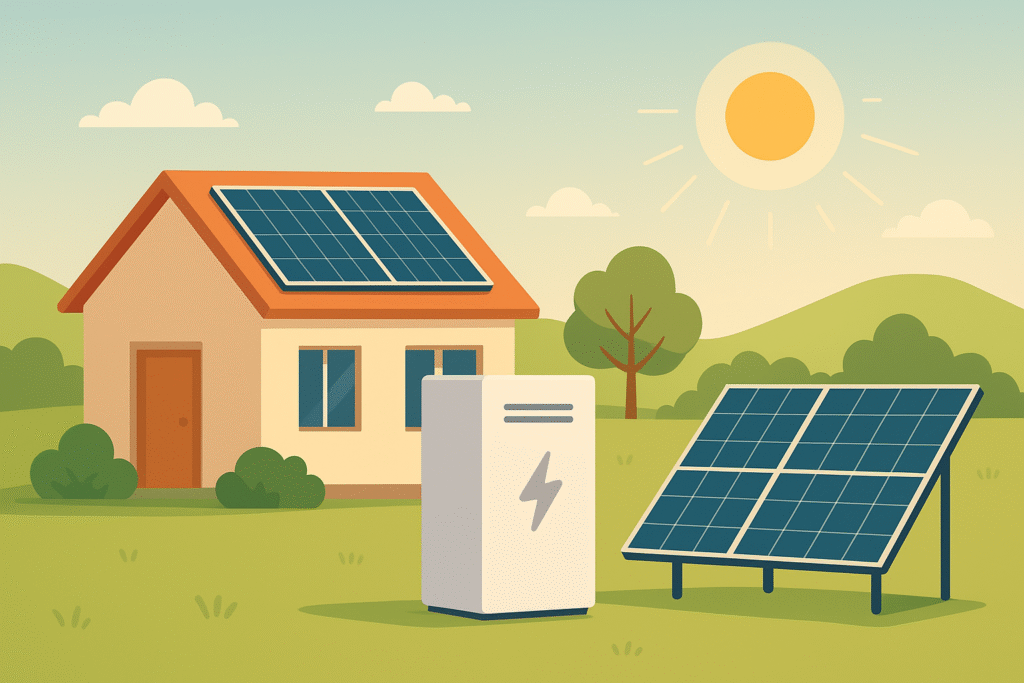How Long Do Solar Batteries Really Last?

Solar energy continues to redefine how homeowners and businesses approach clean and sustainable power. With more people investing in solar panel systems, one key question often arises — how long do solar batteries actually last?
Understanding solar battery lifespan isn’t just about knowing when replacements are due. It’s about maximizing energy efficiency, protecting your investment, and ensuring your solar setup remains cost-effective for years to come. This guide breaks down the key factors that affect battery longevity, compares the most durable types, and explains why professional installation plays a major role in extending lifespan.
Understanding the Lifespan of Solar Batteries
The lifespan of a solar battery determines how long it can store and deliver power effectively before it begins to degrade. On average, most solar batteries last between 5 to 15 years, depending on their type, usage, and maintenance.
Key Factors That Influence Solar Battery Lifespan
Several variables determine how long your solar batteries can stay functional and efficient:
- Battery Type
The kind of battery you choose has the biggest impact on longevity. To explore the strengths and weaknesses of each, check out our guide on Types of Solar Batteries. - Maintenance and Care
Routine maintenance can extend a battery’s life significantly. Neglecting maintenance, on the other hand, can lead to faster degradation. Learn more about Professional Solar Panel Cleaning and why it’s vital to overall system health. - Temperature and Environment
Extreme heat or cold affects the efficiency and lifespan of your batteries. Proper housing, ventilation, and placement are essential to keep the system running at optimal temperature. - Usage Patterns
How often you discharge and recharge the battery also affects durability. Shallow, consistent discharges are healthier than full drain cycles.
Types of Solar Batteries and Their Durability
Not all solar batteries are created equal. The material, chemistry, and design behind each type determine how long it can last and how efficiently it performs.
Lithium-Ion Solar Batteries
Currently the most popular choice among homeowners, Lithium-Ion Solar Batteries are known for their long-lasting performance and compact design.
Advantages of Lithium-Ion Batteries:
- High energy density (more power in a smaller size)
- 10–15 years of lifespan on average
- Fast charging capability
- Lightweight and low maintenance
Their durability and efficiency make them one of the best long-term investments for solar energy storage.
Lead-Acid Solar Batteries
A more traditional option, lead-acid batteries are often used in off-grid solar systems. They’re reliable but generally have shorter lifespans — typically 5 to 8 years.
Pros: Affordable upfront cost and recyclable materials.
Cons: Require regular maintenance and have a lower depth of discharge (DoD).
Flow Batteries
Flow batteries are emerging as a game-changer in solar technology. Their scalable design and ability to store large amounts of energy make them ideal for long-term use.
Explore our detailed insights on Flow Batteries in Solar Tech.
Why Flow Batteries Last Longer:
- Can exceed 20 years of lifespan with proper care
- Flexible storage capacity through adjustable electrolytes
- Resistant to deep discharge damage
Nickel-Cadmium Batteries
Nickel-Cadmium (NiCd) Batteries are known for their ruggedness and ability to perform under extreme conditions. They’ve been used for decades in aviation and industrial applications and remain a solid choice for specific solar setups.
Pros:
- Reliable under extreme temperatures
- Long shelf life
Cons:
- Contains toxic cadmium, raising environmental concerns
- More costly to recycle
Learn more about their role in Solar Energy Storage Systems.
Comparing Longevity: Which Solar Battery Lasts the Longest?
When comparing battery lifespans, Lithium-Ion and Flow Batteries stand out as the top performers. However, the “best” option depends on your energy goals, budget, and system design.
Factors to Consider When Evaluating Longevity
- Cycle Life: Number of charge/discharge cycles before capacity drops below 80%.
- Depth of Discharge (DoD): Higher DoD means more usable energy but faster wear.
- Warranty Coverage: Most quality solar batteries include a 10-year warranty, a reliable indicator of manufacturer confidence.
For a deeper look at high-performing models, visit our Best Solar Batteries page to compare top-rated options.
How Professional Installation Extends Battery Life
Even the best solar batteries won’t reach their full potential without professional installation. Working with certified installers ensures your system is properly configured, ventilated, and protected from environmental stressors.
Benefits of Hiring Professional Solar Installers
- Optimized System Design
Experts tailor your setup to match your power usage, roof layout, and climate. Learn more about how design impacts performance in The Rise of Home Solar Panel Installations. - Warranty and Performance Protection
Professional installations often include equipment and workmanship warranties that safeguard your investment. - Regulatory and Safety Compliance
Local building codes and electrical standards can be complex. Professional installers handle permits, inspections, and ensure everything meets code requirements.
For trusted local professionals, explore Solar Installers Near Me to connect with experts in your area.
Maximizing the Lifespan of Your Solar Battery
To get the most out of your solar investment, follow these maintenance and optimization tips:
- Keep batteries in a cool, dry, and well-ventilated space.
- Regularly check the inverter system for performance reports.
- Avoid over-discharging or overcharging.
- Schedule annual professional inspections.
- Update firmware or battery management systems when available.
These proactive steps help ensure your solar batteries deliver consistent energy for as long as possible.
Conclusion
Understanding how long solar batteries last goes beyond just numbers — it’s about making informed choices that align with your sustainability goals.
From the high-performance reliability of lithium-ion batteries to the long-term promise of flow batteries, the market offers durable solutions for every type of solar setup. Paired with professional installation and routine maintenance, you can extend the lifespan of your solar batteries while maximizing energy efficiency and savings.
Whether you’re upgrading your system or planning a new installation, staying informed ensures you make the best long-term investment for a cleaner, brighter future.